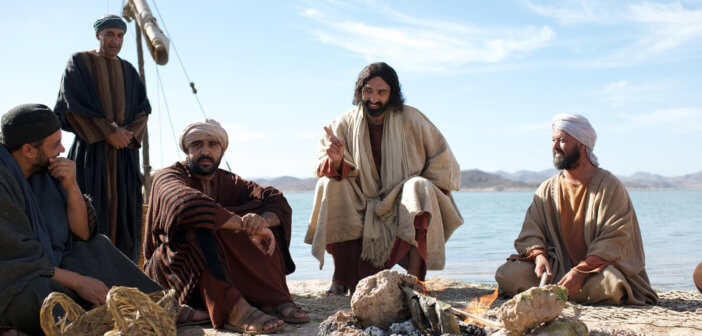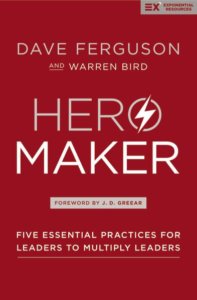Dave Ferguson and Warren Bird explain that for our ministries to have a truly exponential impact, we need to be mentoring, developing, and multiplying disciples. They share four key learnings about how Jesus nurtured his followers by investing time in them.
In John 3:22, the Bible makes an easily overlooked, seemingly mundane statement: “Jesus and his disciples went out into the Judean countryside, where he spent some time with them.” What Jesus did is really quite simple. He selected just a few people — he focused on 12 — and they hung out with him and did ministry alongside him. Yet when Jesus spent some time with these 12 apprentices, something big happened. The word for “spend time” in Greek is pronounced “dia-tree-bo” (and transliterated diatribo). Dia means “to rub against” or “to rub off.” It literally means “to spend time together rubbing off on each other.”
You and I can do that today. When we spend enough time with others, we begin to rub off on them, and they rub off on us. You start talking like each other. You pick up similar interests. You care about the same stuff. Maybe you know some couples who have been married like 50 years, and they have even started to look like each other. They have rubbed off on each other.
What Jesus did was not just about hours and minutes. It was diatribo: some of him was rubbing off on them. One of the main ways Jesus transformed his followers into people who could impact the world was through apprenticeship, by simply spending time with them.
To truly have exponential impact, all of us need to be mentoring, developing, and multiplying leaders. Another place where we see Jesus “rubbing off” on his 12 leadership residents is in the gospel of Mark: “Jesus went up on a mountainside and called to him those he wanted, and they came to him. He appointed 12 that they might be with him and that he might send them out to preach and to have authority to drive out demons” (Mark 3:13-15). There is so much to learn from these verses, but let’s pull four practical insights from how Jesus mentored the Twelve.
1. Disciple multipliers start with the few, not the many. (Mark 3:13-14)
In the verses that immediately precede this section of Scripture, we see that the crowds swelled to large numbers. They all wanted a piece of Jesus. They wanted to hear him talk; they wanted to get close to him. But these verses say Jesus “called to him those he wanted.” I like to think that he picked 12 people “he wanted” to hang out with and with whom “he wanted” to be friends. Jesus was establishing an apprenticeship based on relationship. Equally important to note is that he didn’t give in to the attention and the clamoring of the crowd; instead he started with and focused on the few.
2. Disciple multipliers prioritize relationships, not curriculum. (Mark 3:14)
A phrase in verse 14 reveals the first reason why Jesus selected the Twelve; it was so that “they might be with him.” It’s clear that Jesus was prioritizing relationship with the Twelve. This was truly an apprenticeship that prioritized spending time together, in which the Twelve could observe, learn, and do what Jesus was doing. Apprenticeship is true to the intent and expression of how Jesus did discipleship. Much of our discipleship efforts today focus on content and curriculum, but our hero maker, Jesus prioritized the relationship.
3. Disciple multipliers focus on sending capacity over seating capacity. (Mark 3:14-15)
The goal of this apprenticeship with Jesus was not for the Twelve to go through a set of curriculum, and then double that number to 24 who would go through the class, and then eventually have 48, and then 96, and keep growing the crowd who sat at Jesus’ feet. No!
The goal of the apprenticeship was that “he might send them out” and they would do with others what he had done with them. Jesus wanted his apprentices to get to the place where they could do what he was doing. Once they could “preach and … have authority to drive out demons,” the apprenticeship was complete. Our hero-making approach should involve the same kind of apprenticeship. You don’t want the people you are mentoring to continue to serve as an assistant or even as a coleader. You want them to grow to their full capacity. If you are developing them to lead a group or lead a band or start a church, vocalize that expectation. Make it very clear and get their agreement.
When is the apprenticeship complete? That’s simple: when both you and your apprentice think they are ready to bring on their own apprentices. At that point, commission them and send them out with your blessing.
4. Disciple multipliers hand off authority rather than hold on to it. (Mark 3:15)
Not only did Jesus send out his apprentices but he also gave them authority, often substantial enough to “drive out demons.” Don’t overlook or underestimate spelling out the authority you are giving people. With authority, they’ll feel fully empowered, commissioned to minister, and blessed to go even farther than you did.
To change the world, we need to not only change people but also mobilize those people as change agents. We’ve got the Holy Spirit in us, and the God of the universe wanting it to happen. We can do it!
Taken from Hero Maker: Five Essential Practices for Leaders to Multiply Leaders. Copyright © 2018 by Zondervan. Used by permission of Zondervan.
Related Resources
- More Church Leaders | Stronger Church Leaders Video Tool Kit
- 5 Ways to Engage People the Way Jesus Did by Joe Daniels and Christie Latona
- 5 Ways to Develop New Leaders by Marv Nelson
If you would like to share this article in your newsletter or other publication, please review our reprint guidelines.








